Related Research Articles

Kings Row is a 1942 film starring Ann Sheridan, Robert Cummings, Ronald Reagan and Betty Field that tells a story of young people growing up in a small American town at the turn of the twentieth century. The picture was directed by Sam Wood. The film was adapted by Casey Robinson from a best-selling 1940 novel of the same name by Henry Bellamann. The musical score was composed by Erich Wolfgang Korngold, and the cinematographer was James Wong Howe. The supporting cast features Charles Coburn, Claude Rains, Judith Anderson and Maria Ouspenskaya.

John Boynton Priestley was an English novelist, playwright, screenwriter, broadcaster and social commentator.
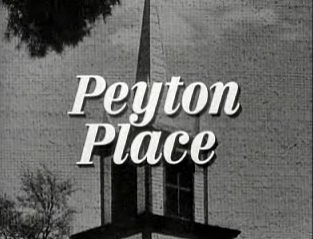
Peyton Place is an American prime-time soap opera that aired on ABC in half-hour episodes from September 15, 1964, to June 2, 1969.

Dervla Kirwan is an Irish actress. She has received a number of accolades, including two IFTA Awards for her performances in the film Ondine (2009) and the RTÉ thriller series Smother (2021–2023) respectively.

Betty Williams is a fictional character from the ITV soap opera Coronation Street, portrayed by former music hall star Betty Driver. Driver was cast as Betty in 1969, after first auditioning for the role of Hilda Ogden, which was given to Jean Alexander. The character arrived in Coronation Street to help her sister Maggie Cooke run the corner shop, and since then had a number of storylines which saw her become twice widowed, and mother to an illegitimate son.
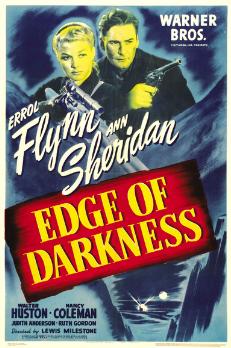
Edge of Darkness is a 1943 World War II film directed by Lewis Milestone that features Errol Flynn, Ann Sheridan, and Walter Huston. The feature is based on a script written by Robert Rossen which was adapted from the 1942 novel The Edge of Darkness by William Woods.

Rupert William Penry-Jones is a British actor, known for his performances as Adam Carter in Spooks, Clive Reader in Silk, DI Joseph Chandler in Whitechapel, and Mr. Quinlan in the American horror series The Strain.
The English author J. B. Priestley wrote a number of dramas during the 1930s and 40s, which have come to be known as his Time Plays. They are so called because each constructs its plot around a particular concept of time. In the plays, various theories of time become a central theatrical device of the play, the characters' lives being affected by how they react to the unusual temporal landscape they encounter.

Harper is a 1966 American mystery film based on Ross Macdonald's 1949 novel The Moving Target and adapted for the screen by novelist William Goldman, who admired MacDonald's writings. The film stars Paul Newman as Lew Harper, and was directed by Jack Smight, with a cast that includes Robert Wagner, Julie Harris, Janet Leigh, Shelley Winters, Lauren Bacall, and Arthur Hill.
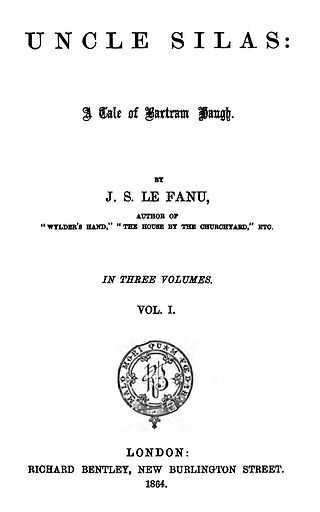
Uncle Silas, subtitled "A Tale of Bartram Haugh", is an 1864 Victorian Gothic mystery-thriller novel by the Irish writer J. Sheridan Le Fanu. Despite Le Fanu resisting its classification as such, the novel has also been hailed as a work of sensation fiction by contemporary reviewers and modern critics alike. It is an early example of the locked-room mystery subgenre, rather than a novel of the supernatural, but does show a strong interest in the occult and in the ideas of Emanuel Swedenborg, a Swedish scientist, philosopher and Christian mystic.
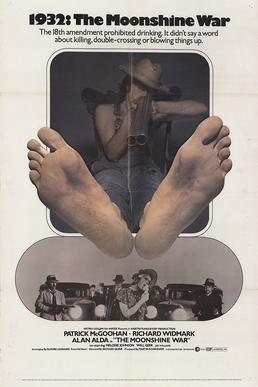
The Moonshine War is a 1970 American crime comedy-drama film directed by Richard Quine, based on the 1969 novel of the same name by Elmore Leonard. It stars Patrick McGoohan, Richard Widmark, Alan Alda, and Will Geer.

Angel Pavement is a novel by J. B. Priestley, published in 1930 after the enormous success of The Good Companions (1929).

Gate of Ivory, Gate of Horn is a fantasy novel by British author Robert Holdstock. It was originally published in the United States in 1997 The story is a prequel to Mythago Wood and explores Christian Huxley's quest into Ryhope Wood and the apparent suicide of his mother, Jennifer Huxley. The title of the book refers to the gates of horn and ivory described in both Homer's Odyssey and Virgil's Aeneid.

Laburnum Grove is a 1936 British comedy film directed by Carol Reed and starring Edmund Gwenn, Cedric Hardwicke and Victoria Hopper. It was based on the 1933 play of the same name written by J. B. Priestley.
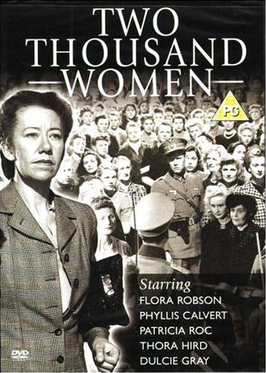
Two Thousand Women is a 1944 British comedy-drama war film about a German internment camp in Occupied France which holds British women who have been resident in the country. Three RAF aircrewmen, whose bomber has been shot down, enter the camp and are hidden by the women from the Germans.

Dangerous Corner is a 1934 American mystery film directed by Phil Rosen, using a screenplay by Anne Morrison Chapin, Madeleine Ruthven, Ralph Berton, and Eugene Berton, which was based on a novel and play of the same name by J. B. Priestley. It starred Virginia Bruce, Conrad Nagel, and Melvyn Douglas.
"Dangerous Corner" is a 1965 Australian television play based on the play Dangerous Corner by J.B. Priestley. It was filmed in Melbourne.
References
- ↑ Theatre arts monthly, Volume 22, Issue 1.
- ↑ Priestley, J. B. (1932). Dangerous Corner. London: Samuel French
- ↑ "John Boynton Priestley (1894-1984)". data.bnf.fr, Bibliothèque nationale de France. Retrieved 7 October 2021.